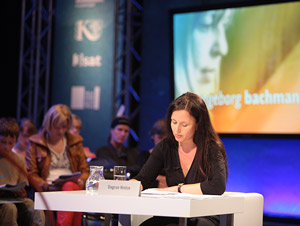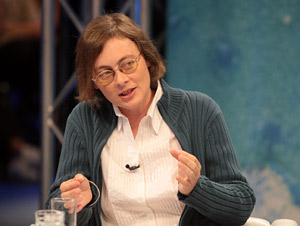
Jury opinion divided on "Fear of Flying"
Dagrun Hintze's "Fear of Flying" was the third reading on this Saturday morning of this year's Bachmann Prize. Burkhard Spinnen invited the German to Klagenfurt. "Fear of Flying" is a text about the "transcendental homelessness" (Ijoma Mangold) of people in the "spiritual warehouse" of the 21st century.
Heiz: I struggle with this text
Presenter Dieter Moor first passed the baton to Andre Vladimir Heiz by asking him why he had been "looking so intensely at the script" when he is usually more inclined to sit back and listen. "I need help with this text, I can't get to grips with it when I read it!", was his response.
He was "deeply impressed" by the research approach and he found the "patchwork-like" construction of the text material very convincing.

Positive: The text resembles an essay
Ijoma Mangold also praised Hintze's "stimulating" text. The experience of people in modern times seems to be that every transcendency has become questionable as an unconditional belief in God: "Sex fantasies and a longing to believe under a pastor's roof!". The resemblance of this text to an essay throws up fruit which can be enjoyed "without hesitation".

"Jesus' whip in the temple" is missing
Ursula März saw it differently: The intellectual reaction to today's spiritualism as a replacement for religion is well known. The spiritual warehouse may well be knocked on the head in the text, but the rage - "Jesus' whip in the temple" is missing here: "The text does not invest in the instrument of literature, the subject could have been written about in a Sunday supplement", the journalistic research was a "big trap" and it lacked the "weaponry" associated with this.

Praise and criticism from Daniela Strigl
"The pastor is also a fireman!", Daniela Strigl began. "The text is clever, but in some places it isn't so clever, it is occasionally banal". She also saw the "earthy combination" of journalism and literature as the problem with the text. "In some places it isn't stringent enough and it doesn't project itself. The superimposed self-addressing "you" narrative is sometimes a touch too much."

Spinnen felt the dialogue was schizoid
Burkhard Spinnen summed up by saying that it is the story of someone who feels totally dejected, who writes, researches in order to carry on living. "The research keeps her alive". In the midst of all these signs of disintegration the character keeps herself alive by being able to talk about these things in this way.

"I would also like to add my voice to the criticism, everything that has been said is valid". He agrees with all of the points of criticism made, his discomfort was caused by the irony which permeated the text, although the structure of the text is good and successfully performed.